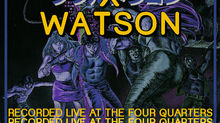Rye Wax Mix Series Issue #5: Pirate Modernity
- Rye Wax Scribes
- Dec 15, 2016
- 4 min read

"...And so it was that we drifted in the void for what seemed like aeons, Suspended by the gravitational pull of the planetary debris and a million miles from the nearest jump gate. Suddenly the sensors picked up a signal, approaching fast. We had been wary of this. The fallout from the battle with C.O.T.C.H. had alerted local scavengers to the quadrant. Unregistered ships manned by outlaws and rogues - this was the tell-tale approach vector of...PIRATE MODERNITY..."
~ ~ ~
When we first opened, one of the first groups to approach us was Pirate Modernity, and ever since we here have been spellbound by the swirling polyrhythmic oddities that PM always bring. We always intended on adding them to our mix series and are delighted to have them as the last mix of the year. We caught up with them about the project and the music inside the mix.

Hello! How's it going?
Very good! We’ve just come back from recording this month’s show on NTS Radio. We have a monthly gig where we play an hour’s worth of music from Afghanistan and the north-western frontier of Pakistan, interspersed with a little bit of talking over
whatever information we can find about the performers or the songs.
For those new to what you guys do, who does Pirate Modernity consist of and what made you start this project?
It’s just the two of us – Timothy Cooper and Abeera Arif-Bashir. Pirate Modernity is a cassette-only archival collective, sharing some sublime popular music from Afghanistan and the Afghan diaspora in Pakistan. Everything we DJ is on cassette and
made during a period of massive musical output, in the early 2000s, mainly in thePakistani city of Peshawar, just across the border of Afghanistan. We collected our archive of mainly Pashto-language (but some Dari and Tajiki-language) cassettes in Peshawar in 2013.
The majority of the music on this release was distributed in Pakistan's Federally Administrated Tribal Areas (FATA) and Khyber Pakhtunkhwa (KP). Due to the instability in much of Eastern Afghanistan over the past three decades these cassettes were largely produced and distributed in Peshawar, the cultural heartland of KP and with whom many Afghans share the Pashto language. Pirate Modernity began when we were living and working in Lahore, and travelling to Peshawar from time to time. Having stopped at a service station on the motorway from Peshawar back to Islamabad we saw these unique and colourful cassettes and bought a couple. In no time we fell in love with the sublime sweep of this utterly unique music.

That is some intense digging indeed. Could you give us an idea of how you actually found the music, as well as getting it all back to the UK?
So, after stumbling on it on the road back to Islamabad it wasn’t hard to find little stores that sold Pashto tapes (and VCDs of old films, but that’s another story). We amassed a bit of a collection while we were there. We bought as much as we could
back to the UK, amid some funny looks at customs, and started to go through them all in greater depth a few months later when we really started to miss Pakistan. How much material did you actually come back with? Quite a bit. But by some stroke of luck we also came across some Afghan grocery stores in London and managed to add to our collection, ending up with the archive as it stands now at just under a thousand tapes.

A lot of the artists featured have presumably stopped making music, voluntarily or otherwise, which makes saving this media all the more important - have you manage to track any of the performers down?
Most of the music we have in the collection was made in the early 2000s, coinciding with a conservative provincial government in the province that cracked down on musical expression. This led to cassette stores being targeted and musicians attacked.
A number were killed during the period and many moved to the United Arab Emirates while things cooled down. Some also stayed and persisted. The music of the era has this unrestrained energy and urgency. Maybe it’s the technology or the studios they all seemed to share (we can guess this by the ubiquity of the stock sound effects – like the percussive woman’s scream – common to many of the recordings) that gives the music such a distinct audio aesthetic.
It’s hard to put into words, but the balance between the tonal resonances of the acoustic instruments played with impossible virtuosity combined with distorted, auto-tuned vocals and purposefully rough and ready production, really sets this music apart for us. If only we knew more about it. Alongside a few friends of ours we have been trying to get hold of some of the musicians, with the loose idea of making some kind of documentary. We’d love to get in touch with all of them, but particularly the drum-led, autontuned attan singers Noor Muhammad Katwazee and Noor Muhammad Kochi. We’d also love to talk with the most famous of all the singers we play, Nazia Iqbal. Her output is nothing short of prodigious. It seems a good tenth of the cassettes we have are hers and she’s still only in her mid-30s.
The first tape release sold out in Rye Wax, can we expect any more in the way of compilations or releases?

No plans as of yet, as we’re really enjoying the monthly NTS show as an outlet for our digging and research. We played a thoroughly enjoyable set at Café Oto recently but are really looking forward to getting back and playing a set at our spiritual home, Rye Wax.
Any plans for other musical expeditions?
Well we’ll be doing a year’s worth of fieldwork in Lahore starting the middle of 2017, so we hope to learn more about the musicians while we’re there and hopefully see some of the acts live. Pakistan is dizzyingly rich in musical terms. A friend of mine
tells me that the music coming out of Saraiki-speaking parts of south Punjab is pretty hot right now. You give them a USB and they fill it full of tunes. Maybe when we come back we’ll be DJing from USB!
Thanks again guys!









































Comments